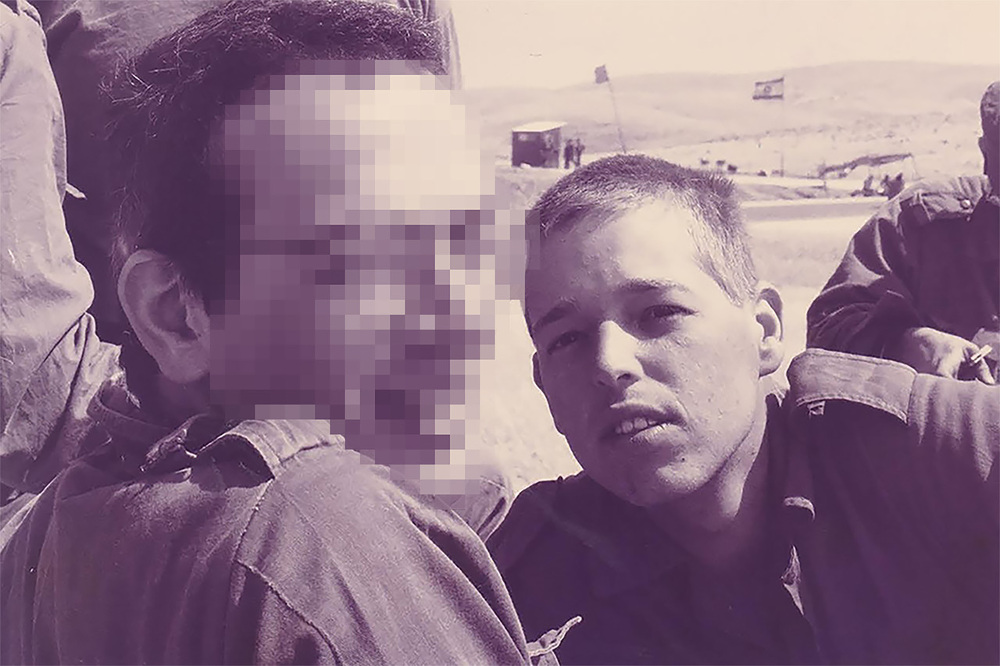Edinburgh Fringe 2023 reviews: Distant Memories of the Near Future / Soldiers of Tomorrow | reviews, news & interviews
Edinburgh Fringe 2023 reviews: Distant Memories of the Near Future / Soldiers of Tomorrow
Edinburgh Fringe 2023 reviews: Distant Memories of the Near Future / Soldiers of Tomorrow
Government-mandated coupledom and intractable conflicts in two Fringe shows at Summerhall

Distant Memories of the Near Future, Summerhall ★★★★
About three decades into the future, love has been "solved" – with (what else?) an algorithm, and a healthy splash of AI. It’s so successful, in fact, that states worldwide officially mandate computer-generated coupledom because of its benefits for productivity and consumption. Heaven help you if you’re one of the rare undesirables, unmatchable with another by the ubiquitous Q-PID app. Meanwhile, all the flowers have disappeared, asteroids are being mined for their rare minerals (now exhausted on Earth), and a compulsary daily 10-minute advert exposure comes courtesy of the Department of Productivity and Amazon.
There’s quite a lot of whimsy in David Head’s solo storytelling show of five interconnected tales from a dystopian near future, but his targets – consumerism, the commodification of emotions, climate change – are rock-hard. Most importantly, it’s all unsettlingly plausible – not just in the small imaginative leaps that Head makes from where we are now, but also because of his deadpan delivery and spot-on TV ads and AI simulations.
And that’s where the charm of Distant Memories of the Near Future comes in. Scratch the surface, and there are some pretty horrifying predictions being made, but Head delivers them with dark, knowing humour, and an emphasis on the value of authentic human connection that – he insists – will forever transcend the technology-mediated transactions he’s describing. So much so that it’s only after the show has ended that you might begin to realise quite how bleak Head’s visions really are.
He’s a low-key, gently spoken performer, captivating in his delivery and clear-headed in his evocative, enjoyably complex writing. There are moments – notably, and most atmosphere-disturbingly, towards the end – where Head’s lengthy use of video threatens to break the human connection he offers, and thereby undermine the argument of his show. Nonetheless, Distant Memories of the Near Future is a beautifully crafted, gently satirical and scarily believable vision of the future, delivered with charm and insight.
 Soldiers of Tomorrow, Summerhall ★★★
Soldiers of Tomorrow, Summerhall ★★★
There’s a distinctly chilling memory lodged behind the show’s somewhat militaristic title, as Jerusalem-born, now Vancouver-based actor and deviser Itai Erdal remembers his eight-year-old nephew in Israel being sent home from school with an empty box, and orders to fill it with provisions for soldiers on the front line. The dedication inside read: "For the soldiers of today, from the soldiers of tomorrow."
The implications of endless conflict, endless violence and endless loss of life are clear. And while there’s no shortage of quiet sadness in Erdal’s poignant show for The Elbow Theatre, it’s far from a holler of rage at the intractable Arab-Israeli conflict, still less a side-taking bit of agit-prop.
Instead, Soldiers of Tomorrow is a surprisingly gentle, personal piece about memory and human suffering, as Erdal frankly recounts his own military service, and the unlikely friendships he built as a result, while never shying away from the ends to which that training might later be put. Memories of a later checkpoint encounter with a grandmother and a sick child are particularly harrowing, for example. Brian Ball’s simple but effective set design surrounds Erdal threateningly with troupes of miniature soldiers, but are they the enemy forces he’ll be asked to fight, or perhaps the endless ranks of his own side? A box of flags serves as a reminder of the long history of Middle East conflict and occupation.
In the end, Soldiers of Tomorrow may prove a little too reflective to convincingly grapple with the big questions it raises, let alone suggest any answers. But it nonetheless provides a deeply human perspective on the conflict and its cycles of violence, and shines a bright light on the breadth of Israeli experience.
Share this article
The future of Arts Journalism
You can stop theartsdesk.com closing!
We urgently need financing to survive. Our fundraising drive has thus far raised £49,000 but we need to reach £100,000 or we will be forced to close. Please contribute here: https://gofund.me/c3f6033d
And if you can forward this information to anyone who might assist, we’d be grateful.

Subscribe to theartsdesk.com
Thank you for continuing to read our work on theartsdesk.com. For unlimited access to every article in its entirety, including our archive of more than 15,000 pieces, we're asking for £5 per month or £40 per year. We feel it's a very good deal, and hope you do too.
To take a subscription now simply click here.
And if you're looking for that extra gift for a friend or family member, why not treat them to a theartsdesk.com gift subscription?
more Theatre
 Othello, Theatre Royal, Haymarket review - a surprising mix of stateliness and ironic humour
David Harewood and Toby Jones at odds
Othello, Theatre Royal, Haymarket review - a surprising mix of stateliness and ironic humour
David Harewood and Toby Jones at odds
 Macbeth, RSC, Stratford review - Glaswegian gangs and ghoulies prove gripping
Sam Heughan's Macbeth cannot quite find a home in a mobster pub
Macbeth, RSC, Stratford review - Glaswegian gangs and ghoulies prove gripping
Sam Heughan's Macbeth cannot quite find a home in a mobster pub
 The Line of Beauty, Almeida Theatre review - the 80s revisited in theatrically ravishing form
Alan Hollinghurst novel is cunningly filleted, very finely acted
The Line of Beauty, Almeida Theatre review - the 80s revisited in theatrically ravishing form
Alan Hollinghurst novel is cunningly filleted, very finely acted
 Wendy & Peter Pan, Barbican Theatre review - mixed bag of panto and comic play, turned up to 11
The RSC adaptation is aimed at children, though all will thrill to its spectacle
Wendy & Peter Pan, Barbican Theatre review - mixed bag of panto and comic play, turned up to 11
The RSC adaptation is aimed at children, though all will thrill to its spectacle
 Hedda, Orange Tree Theatre review - a monument reimagined, perhaps even improved
Scandinavian masterpiece transplanted into a London reeling from the ravages of war
Hedda, Orange Tree Theatre review - a monument reimagined, perhaps even improved
Scandinavian masterpiece transplanted into a London reeling from the ravages of war
 The Assembled Parties, Hampstead review - a rarity, a well-made play delivered straight
Witty but poignant tribute to the strength of family ties as all around disintegrates
The Assembled Parties, Hampstead review - a rarity, a well-made play delivered straight
Witty but poignant tribute to the strength of family ties as all around disintegrates
 Mary Page Marlowe, Old Vic review - a starry portrait of a splintered life
Tracy Letts's Off Broadway play makes a shimmeringly powerful London debut
Mary Page Marlowe, Old Vic review - a starry portrait of a splintered life
Tracy Letts's Off Broadway play makes a shimmeringly powerful London debut
 Little Brother, Soho Theatre review - light, bright but emotionally true
This Verity Bargate Award-winning dramedy is entertaining as well as thought provoking
Little Brother, Soho Theatre review - light, bright but emotionally true
This Verity Bargate Award-winning dramedy is entertaining as well as thought provoking
 The Unbelievers, Royal Court Theatre - grimly compelling, powerfully performed
Nick Payne's new play is amongst his best
The Unbelievers, Royal Court Theatre - grimly compelling, powerfully performed
Nick Payne's new play is amongst his best
 The Maids, Donmar Warehouse review - vibrant cast lost in a spectacular-looking fever dream
Kip Williams revises Genet, with little gained in the update except eye-popping visuals
The Maids, Donmar Warehouse review - vibrant cast lost in a spectacular-looking fever dream
Kip Williams revises Genet, with little gained in the update except eye-popping visuals
 Ragdoll, Jermyn Street Theatre review - compelling and emotionally truthful
Katherine Moar returns with a Patty Hearst-inspired follow up to her debut hit 'Farm Hall'
Ragdoll, Jermyn Street Theatre review - compelling and emotionally truthful
Katherine Moar returns with a Patty Hearst-inspired follow up to her debut hit 'Farm Hall'
 Troilus and Cressida, Globe Theatre review - a 'problem play' with added problems
Raucous and carnivalesque, but also ugly and incomprehensible
Troilus and Cressida, Globe Theatre review - a 'problem play' with added problems
Raucous and carnivalesque, but also ugly and incomprehensible

Add comment